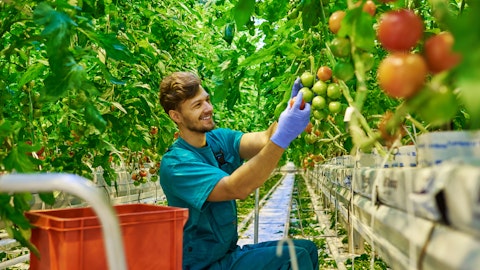And when you take a step back and you think that over the last six quarters, we have secured $50 million, little over $50 million of commercial business in sectors where we didn’t set out to go down that path when we listed on the NASDAQ, but we’ve taken that path as a diversification strategy that really has paid off nicely for the company thus far, set us up nicely for the future. And when the cannabis industry does have its resurgence, which everyone, of course, hopes is quicker rather than longer, we’re not going to stop on the other side. We’re going to invest and continuing to build out, because what we’ve learned is we can utilize all of our professional services experts and our site troopers and project managers in all areas. So we have that big pool of talent and expertise that can be used on the build or on the design regardless of what sector it’s in.
So exciting for the future. But bringing it back to today, we have to execute in quarter-by-quarter and earn credibility back.
Scott Fortune: And then one quick follow-up for me then on the CEA side. Obviously, kind of dependent on rescheduling when that happens. But moving forward, is this still a state led growth story for a lot of the cannabis industry? And like you mentioned down in New York, you’re seeing a ramp there potentially, Ohio comes on board in the fall of ’24. But the big opportunity is Florida. We’re seeing or we’re hearing a lot of the cannabis MSOs are looking to actually build out. They need to build out production capacity ahead of Florida potentially flipping. But just kind of your sense of color in the pipeline, the discussion of capacity builds in the key states as we see regulation kind of play out here in the second half? Just kind of discussions you’re having on capacity adds from that standpoint?
Brad Nattrass: New Jersey, New York, Ohio, Pennsylvania and Florida, so no contracts, but lots of discussion, lots of planning. The planning could be design of the facilities or design of the dispensaries. But from a build standpoint, I believe that the state, the operators in these states will want to get a little further down the road. First hurdle in Florida is having the Florida Supreme Court not say anything before April 1st, right? And fingers crossed that that doesn’t happen, then it’ll be on the ballot, then they have to finish with a total over 60% and they’re pulling above that right now. So lots of eyes on Florida, that’s sort of the exciting rallying cry right now, I’d say, in the industry for sure. Second is Pennsylvania and getting it on the ballot there.
But the working capital, getting rid of — with rescheduling and abolishing the 280E that’s going to give some of the larger multi-state operators $120 million, $180 million per year in working capital, and these leaders have said publicly that they’re going to put those funds back in to expand their footprint. And that’s what urban-gro does. We design facilities and dispensaries and we build them. So I feel that it will be very positive for the company should rescheduling happen. Let’s say for banking, that’ll bring money in. And Scott, that’s the biggest hurdle right now is there positive optimism more than I’ve seen in terms of sentiment for a couple of years, for sure, but still the working capital is not there. And so everybody is positive but we got to have some sort of catalyst.
Operator: The next question is from Anthony Vendetti with Maxim Group.
Thomas McGovern: This is Thomas McGovern on for Anthony. So yes, just to kind of touch back on some of this regulatory front, I know you’ve talked about it quite a bit on this call, but I wanted to hone in a little bit more on the SAFER Banking Act. You just mentioned its importance in terms of funding a lot of these deals. But with that on the horizon, I just want to see like ignoring any potential statewide legalizations, if this act were to be passed, do you guys have potential projects that are maybe not yet considered backlog that are more pipeline projects that you expect to kind of progress once funding frees up, or just kind of tell us how that would play out as a catalyst in ’24?
Dick Akright: Thomas, the answer is for sure, right? To be in our backlog, we have to have a signed contract and there’s equipment, there’s deposit received and we’re actively working on it. And we treat backlog very serious. We’ve taken items out of backlog a couple of times actually in early 2023. So we really truly want that to be a barometer of how we’re going to perform in the next one to six quarters. And so when it’s signed it becomes backlog. Right now, that would be in pipeline and we have a strong growing qualified pipeline. We don’t announce the size of the pipeline but we absolutely have a lot of projects that would fit in there once one of those catalysts gets. And so with the SAFE Banking or SAFER Banking, that would potentially allow the operators to list on the larger exchanges and then access — have easier, more efficient access to capital and institutional investors as well.
So that would be phenomenal for the industry. Now you did mention also state or federal legalization or state rights. We don’t see interstate commerce or legal — interstate commerce for maybe a decade, legalization still three to five years. I think this will be a state gain for the foreseeable future for us.
Thomas McGovern: And then another thing you touched on, on the call was the international markets, and you specifically called out Germany where I know you guys have done a lot of work, although, you are pulling back some of the expenses associated with that subsidiary, reducing headcount and the like. I just wanted to comment, because I saw an article that was published 6 hours ago saying that Germany’s marijuana Bill had been signed and passed into law and that it would take effect on Monday. And I haven’t really had a chance to dive into this further. But I just want to know with that news, that recent news kind of hitting the headlines now hitting the wire, how does that shape? I know — again, I know that you guys aren’t pulling back expenses on that front.


